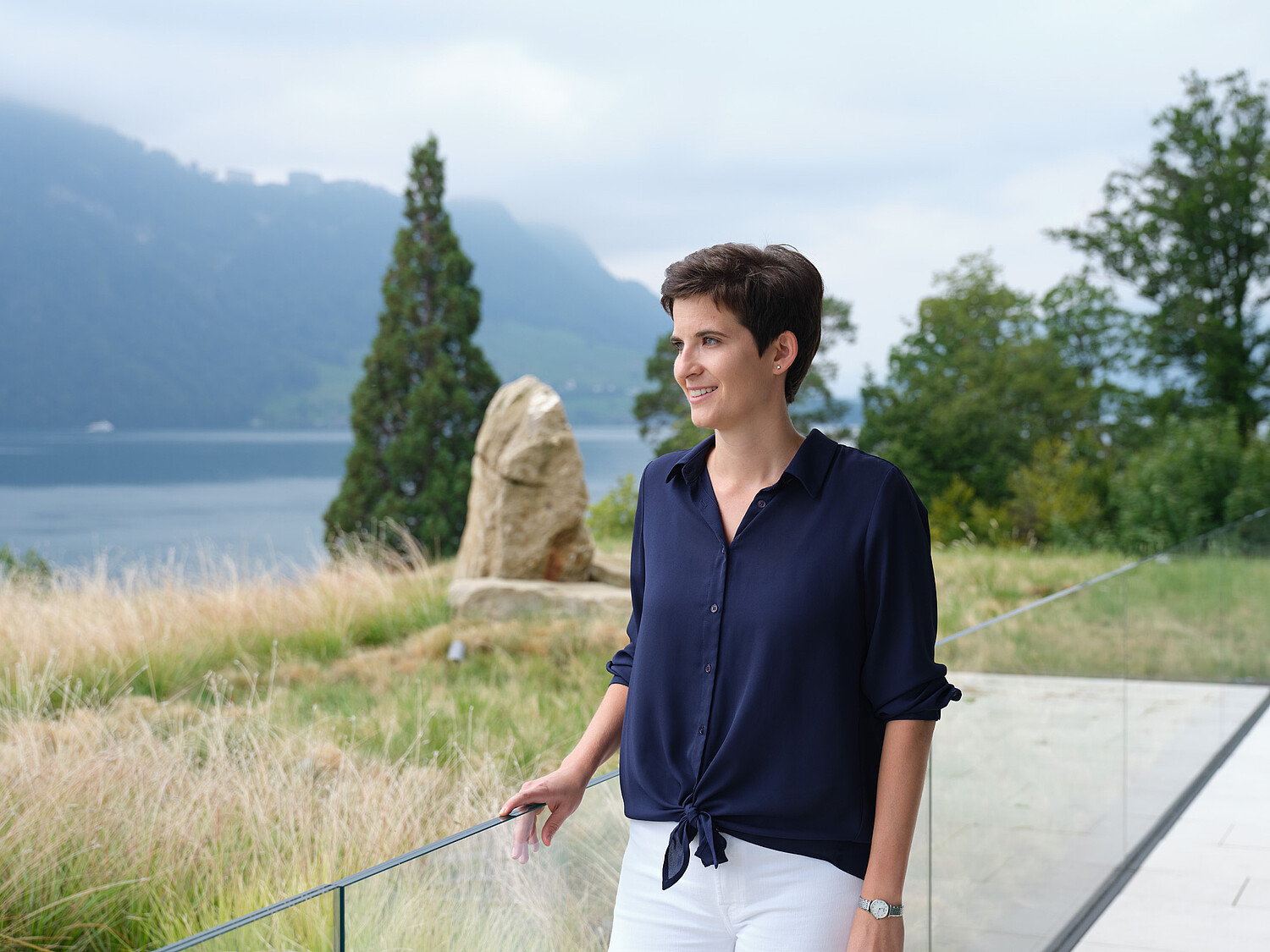
From occupational therapist to managing director
She manages the two cereneo neurorehabilitation clinic sites on Lake Lucerne, holds the post of CEO at owner company NRG Holding and is pressing ahead with the group’s development of telerehabilitation at its Amsterdam and Berlin locations: occupational therapy graduate Irene Christen.
It’s hard to imagine a more delightful setting. The cereneo rehabilitation clinic in Hertenstein sits on a peninsula on Lake Lucerne, and Irene Christen’s office affords her a view over the lake and mountains. The 34-year-old is managing director of the neurorehabilitation clinics. The sites in Hertenstein und Vitznau provide treatment primarily for patients who have suffered a stroke or traumatic brain injury and also for patients with Parkinson’s disease.
Assistance in setting up the outpatient clinic in Dubai
Sitting on a stool at her black office desk, the ZHAW graduate recounts: “It was here at cereneo that I took up my first job after obtaining my Bachelor in Occupational Therapy – and it was the perfect fit.” That was in 2012 and marked the start of a steep career. The occupational therapist was able to assist in setting up the clinic in Vitznau, enjoying great freedom in its configuration and assuming an increasing amount of responsibility – first in her own specific area of work and then as Head of Therapies. She also helped with human resources management and was involved in the development of an outpatient clinic in Dubai, which opened in 2017. “We set up the outpatient clinic after seeing that there was a lack of aftercare facilities for our patients from the United Arab Emirates.”
“Knowing that I’m working with a strong team gives me great pleasure and also the freedom to work more strategically.”
Over time, Christen earned the trust of the clinic owners – NRG Group. After a number of changes at management level, they asked her in 2018 whether she would be willing to take on the post of manager of the Vitznau clinic. And she was bold enough to say yes. To acquire the necessary business know-how, she obtained an Executive MBA from the University of St. Gallen. Then, when the clinic location of Hertenstein was set up at a later date, she took charge of coordinating the development work before taking on the management of this second clinic in 2020, too.
CEO of NRG Group
Since then, she has been in charge of the two clinic locations in Switzerland with 120 employees. And that’s not all. In 2020, she was additionally appointed CEO of NRG Group Holding and is pressing ahead with the development of digital therapeutic services at group level in the Amsterdam and Berlin locations.
Parallels between occupational therapy and management
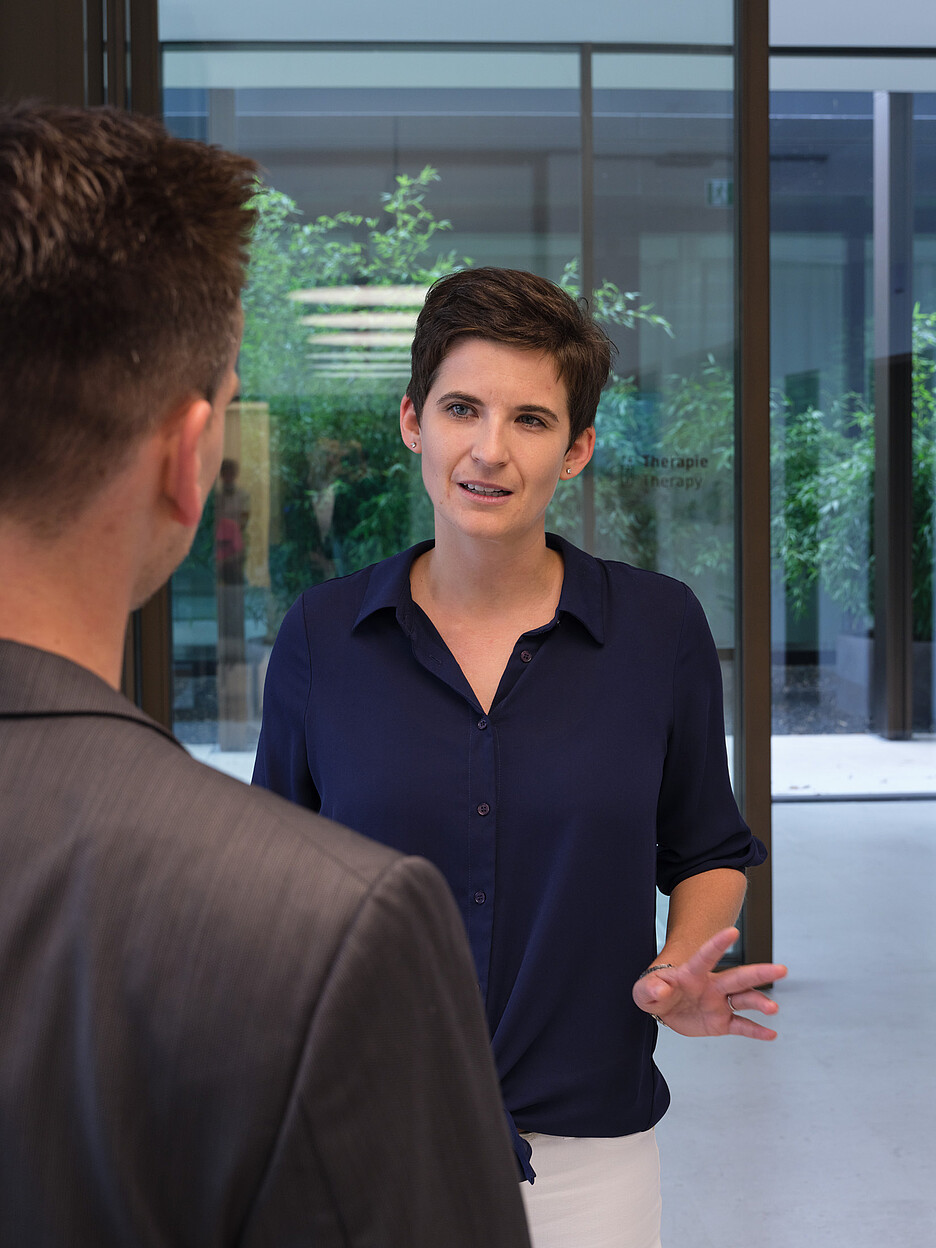
Irene Christen sees parallels between occupational therapy and her management tasks. “For both jobs, you need to like people and feel responsible for the success of others. My job is to enable our staff to work successfully with their patients. The therapist’s job is to successfully accompany the patients to their rehabilitation goal.”
“For both jobs, you need to like people and feel responsible for the success of others.”
The fact that she likes people and enjoys being among them is also evident on this particular morning. The managing director greets the six new trainees and attends the morning kick-off where all the staff start the day together. She then takes the journalist on a tour of the clinic. On our way around, we call in on Meret Branscheidt, a senior physician who specialises in brain stimulation. In front of her sits a young patient from the Arab region. He has suffered a brain haemorrhage and an injury to his spinal cord. The doctor is holding a black device over his head to stimulate his brain. The specialist jargon for this is transcranial magnetic stimulation, or TMS for short. “I’m trying to remind the brain of the four-lane motorway that used to run right through to his fingers”, the doctor says in explaining this therapy.
Involving the families
The patient’s father and brother are waiting outside the treatment room. Irene Christen also welcomes this: “Here at cereneo we consider it important to involve the family.” In the case of patients coming from abroad, the clinic ensures that their family can stay either with them or in apartments nearby. A third of our international patients come from the Arab region, a third from Europe and a third from other parts of the world, such as South America.

“Many of our patients live their everyday lives in homes that are like a 5-star hotel.”
The two Swiss clinics are aimed primarily at people who are accustomed to a certain degree of luxury. “Many of our patients live their everyday lives in homes that are like a 5-star hotel”, says Irene Christen and continues: “We offer rehabilitation with accommodation that is commensurate with this standard.” When Niki Lauda once came for treatment on Lake Lucerne, the media reported: “What a luxurious rehabilitation clinic!”
Personalised treatment
The clinic also admits patients from Switzerland with standard health insurance, however. “The quality of the treatment is exactly the same”, Christen assures me. The treatment is highly personalised so as to ensure that all patients derive the best possible benefit from it. The affiliated research centre enables cereneo to offer its patients new findings and innovative treatment methods, including ones involving robotics, sensor technology and brain stimulation. “It is important for us to ensure that our patients can benefit from the research findings in practice as rapidly as possible”, explains the managing director – “we as a company are particularly proud of this.”
European Master in Occupational Therapy
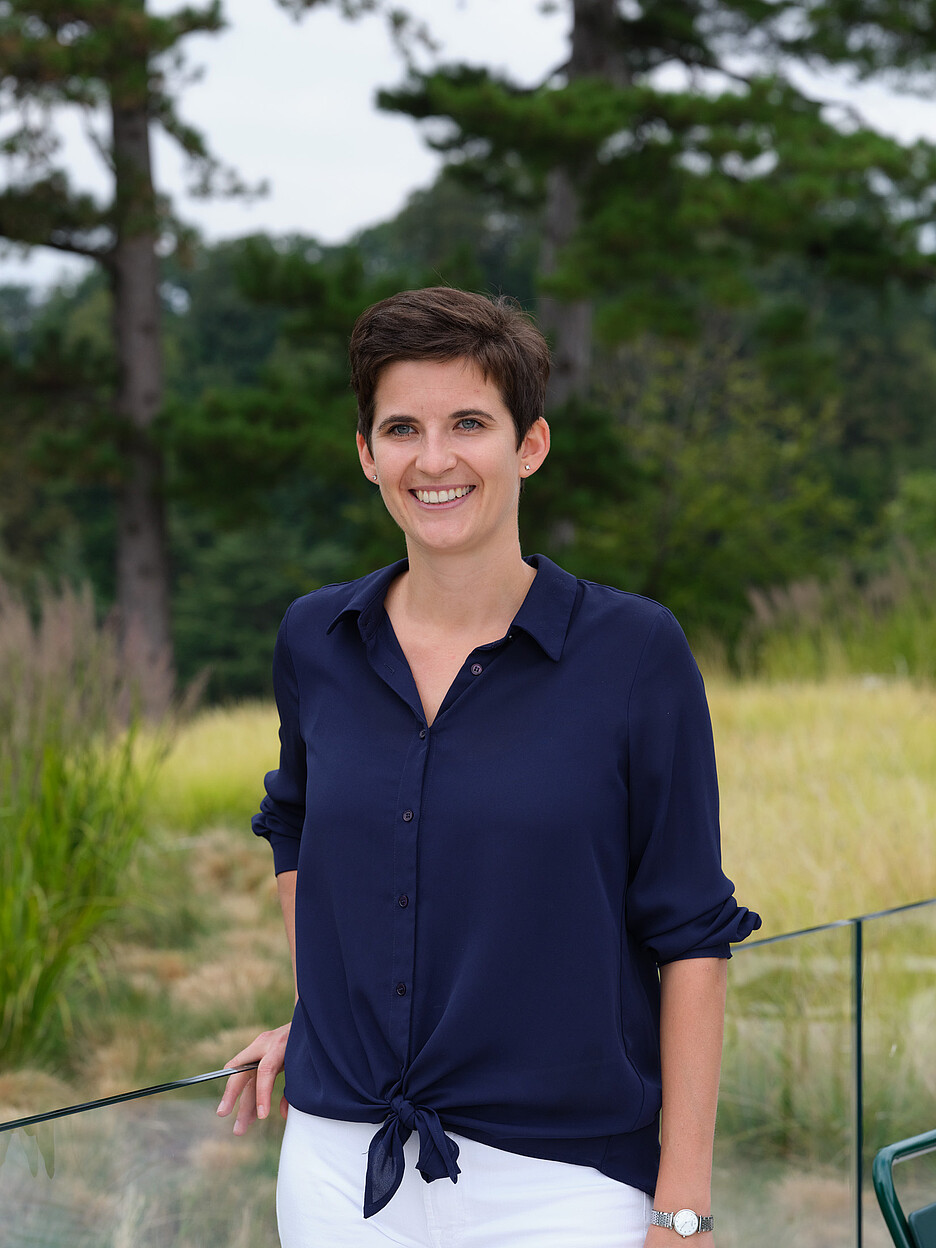
At one stage, the ZHAW graduate herself was faced with the question of whether she should switch to research. “I took the MSc in Occupational Therapy to see whether I would like to go into research or teaching in future.” She regards the internationally orientated European Master in Occupational Therapy at ZHAW as an optimum basis for opening up all the different career options. “I learned a lot about adopting a scientific approach and also networked with those who, like myself, were looking for that extra portion of additional knowledge.”
Opting for management instead of research
Over time, she came to realise that she was a generalist and cut out for management work and she subsequently went on to focus fully on this. Working in the healthcare sector for patients was still a matter of importance for her – “this makes my work meaningful and enables me to apply the knowledge I built up at ZHAW on a daily basis and benefit from it.” She thus has the optimum background for her current work. “To run a clinic, it is ideal to be interested in organisation, management, leadership and finances and to have a medical or therapeutic background at the same time.” That makes it much easier when communicating with medical, therapeutic and nursing staff, as well as with researchers, since you have a certain command of their vocabulary and a better understanding of their day-to-day work than someone whose background is purely in business administration.
“With telemedicine, it ought to be possible to sustainably maintain the progress achieved in rehab.”
Her duties as managing director also include representing the clinics and looking out for new partners to cooperate with. This takes her to numerous events and conferences. “As a woman, you still stand out among the predominantly older men attired in suits. And that can also be an advantage for the clinic”, she says and laughs.
Telerehabilitation at home
Since her last career move to the post of CEO at NRG Holding, she has reorganised the management team and handed a large number of operational management tasks over to others. “Knowing that I’m working with a strong team gives me great pleasure and also the freedom to work more strategically.” Telemedicine is a major topic here. On this particular day, she has an online meeting scheduled with the branch in Amsterdam where cereneo is setting up a telemedicine centre. Founded a year ago, this is intended as a follow-on solution for patients once they return home from their inpatient stay in Switzerland. It will be available for patients from Dubai too, since the former outpatient clinic had to be closed two years ago due to the corona pandemic. Telerehabilitation aims to provide further support for patients in their own homes. "We also send a therapist to the patients’ home, if necessary, to accompany them during the transition from their stay in the clinic." This transition always constitutes a big challenge for patients and their families since, without continuity, the skills they learned during their inpatient stay would quickly be lost again. The idea is that, with telemedicine, it ought to be possible to sustainably maintain the progress achieved in rehab.
A clear divide between work and leisure
Given all the duties and projects she has been speaking about, it soon becomes clear that Irene Christen is seldom to be found in her office with its magnificent view. One day a week, she also works from home in Lucerne. Maintaining a clear divide between work and leisure is very important for her. She tries not to work in the evenings or at weekends – “and I generally manage not to”, she says with a wink.
In Lucerne, she lives with her partner and husband-to-be. Their wedding is coming up soon. Irene Christen explains that she has been spared any feelings of planning stress in her private life due to the fact that “we are both good planners and have engaged in small-scale project management. Now, everything is ready and we’re completely relaxed”, she says at the end of our tour as she takes leave of me in one of the meeting rooms of this clinic overlooking the delightful Lake Lucerne.
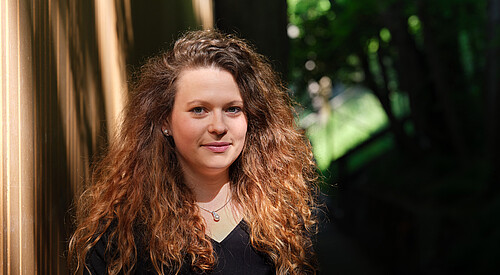
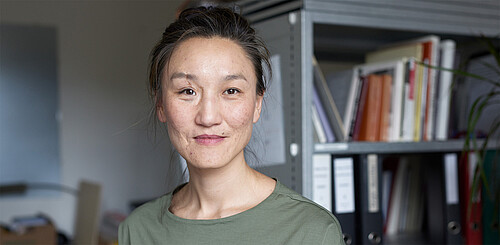
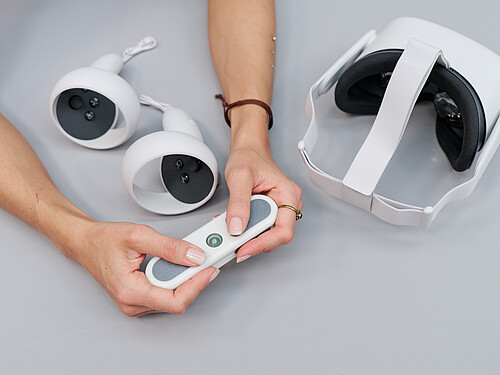
0 Comments
Be the First to Comment!